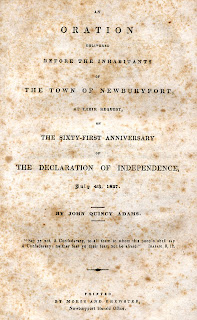Equally astonishing to their contemporaries
and readers today, Thomas Jefferson and John Adams both passed away on July 4th,
1826, the 50th celebration of our nation’s independence. Soon after, John Quincy Adams issued an
Executive Order observing their deaths. Infused
with religious parallels and grounded in Puritan principles, Adams looked back on
their legacies while prophesying an abundant vision for the future.
Adams
began by proclaiming the sovereignty of God and noted that it was nothing less
than an act of “Divine Providence” that these great men died on the anniversary
of one their greatest achievements. Dismissing
any possibility of coincidence, Adams asserted that their simultaneous departure
was “Heaven” directed. The fact that these
men’s lives, dedicated to the cause of liberty, ended in such a manner must, noted
Adams, support the notion that their ideas, policies, and beloved new nation were,
and forever will be, blessed by the Lord!
Adams’
message strikingly mirrored the charge in Leviticus 25:10-11 to “consecrate the
fiftieth year and…proclaim liberty throughout the land.” Trained with The New England Primer, a Puritan educational text, and raised
within a congregational church, it comes as no surprise to see Adams employing
phrasing such as “prophetic” and “jubilee.”
His Puritan postmillennial ideology also surfaced in his approach to the
idea of “Manifest Destiny” and the optimistic nationalistic thought implied within
his text (Eidsmoe, 32).
Eleven
years later, in an Independence Day oration to the people of Newburyport,
Massachusetts, John Quincy Adams once again wove a spiritual thread throughout
the fabric of his address. Themes of
heritage, hopefulness, and national strength were embodied in the message. Adams affirmed the inseparable bond between
the birth of the nation and the birth of the Savior. It is Christ’s precepts and truths that acted
as the “cornerstone” during America’s foundational period, Adams recalled. Harkening back to 1776, he continued by
reflecting on the Declaration of Independence.
Choosing the word “manifesto,” Adams communicated that this document not
only dissolved our ties to the Crown, but served as a platform for propagating ideals
of freedom to the world! Briefly commenting
on the Revolution, he spoke of war being like a fiery furnace for the new
nation, purifying and developing their resolve through pain and hardship.
Both
in the spheres of governance and battle, Adams saw God on the side of the fledgling
nation. He alluded to the idea that Americans
are a “chosen people” using Old Testament passages and challenged his audience
to evaluate their state against “the glories of a generation past away.” Adams talked of an unbreakable link between
God and the nation’s “missional” identity as both a recipient and propagator of
His blessings. This is a radical
departure from modern thinking, saturated in the principle of separation of
church and state. It is vital, as Adams exhorted,
to “cast your eyes backwards.” May we,
each Independence Day, recall the intervention of God and the biblical
principles enshrined within our founding documents!
Works
Cited
Eidsmoe,
John. Christianity and the
Constitution: The Faith of Our Founding Fathers. Grand
Rapids, MI: Baker Publishing Group, 1995.



No comments:
Post a Comment